Is Lamb Meat Healthy? Exploring Its Benefits, Risks, and Nutritional Value. Discover if lamb meat is a healthy choice for your diet. Learn about its nutritional benefits, potential health risks, and tips for incorporating it into a balanced diet. Find out how lamb compares to other meats and make informed choices for your health.
Introduction
Is lamb meat healthy? This question often arises for those who enjoy the tender, flavorful taste of lamb but are concerned about their health. Lamb, a staple in many cuisines worldwide, is known for its rich flavor and versatility in cooking. However, like all meats, it has both its benefits and potential drawbacks. In this article, we’ll dive deep into the nutritional value of lamb meat, explore its health benefits and risks, and provide tips on how to incorporate it into a balanced diet.
Is Lamb Meat Healthy
What is Lamb Meat?
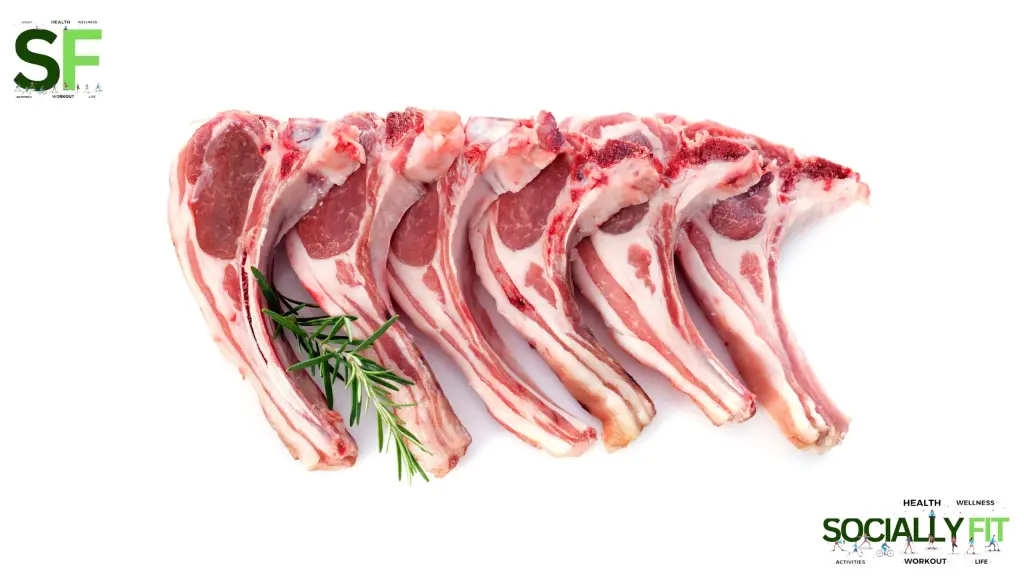
Definition and Types of Lamb Meat
Lamb meat comes from young sheep, typically less than a year old. This meat is known for its tenderness and is often preferred over older sheep meat, known as mutton, which has a stronger flavor and tougher texture. Lamb can be divided into various cuts, such as the shoulder, leg, loin, and rack, each offering different culinary experiences.
Nutritional Profile of Lamb Meat
Lamb meat is packed with nutrients that are essential for the body. A 100-gram serving of cooked lamb typically provides:
| Nutrient | Amount per 100g |
|---|---|
| Calories | 258 kcal |
| Protein | 25.6 g |
| Fat | 17.1 g |
| Saturated Fat | 7.7 g |
| Omega-3 Fatty Acids | 0.2 g |
| Vitamin B12 | 2.3 µg |
| Zinc | 4.5 mg |
| Iron | 1.9 mg |
This table showcases lamb as a rich source of high-quality protein, essential vitamins, and minerals, making it a valuable addition to a balanced diet.
Is Lamb Meat Healthy
Health Benefits of Lamb Meat
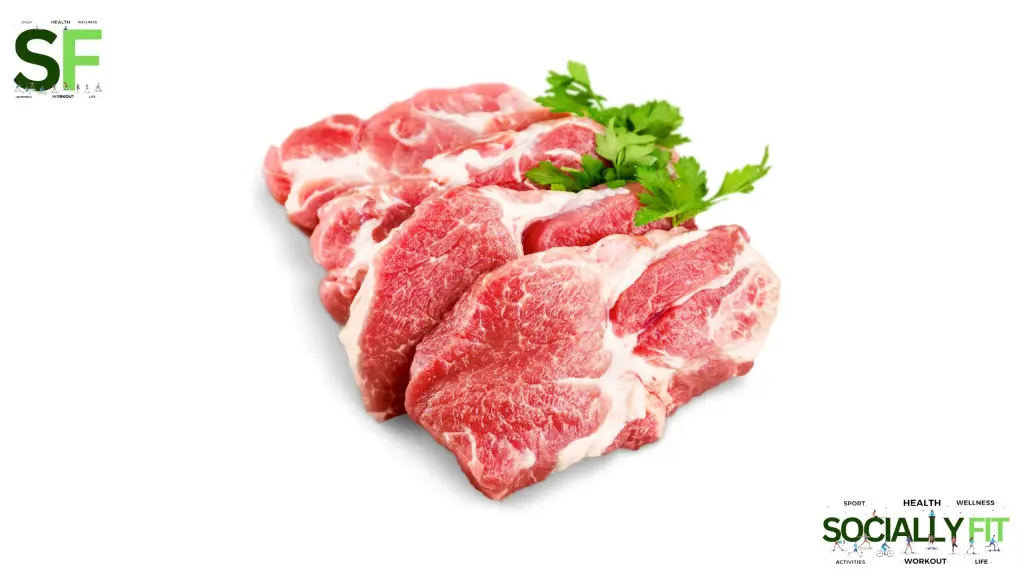
- High-Quality Protein
Lamb provides a complete protein, containing all essential amino acids needed for muscle repair and growth. - Rich in Vitamins
It’s an excellent source of vitamin B12, crucial for red blood cell formation and neurological function. - Iron-Rich
Lamb is high in heme iron, which is easily absorbed and supports healthy blood and energy levels. - Good Source of Zinc
It contains zinc, which plays a key role in immune function, wound healing, and DNA synthesis. - Omega-3 Fatty Acids
Especially in grass-fed lamb, omega-3s help reduce inflammation and promote heart health. - Conjugated Linoleic Acid (CLA)
Lamb is rich in CLA, a fat associated with improved body composition and fat loss. - High in Selenium
It provides selenium, an antioxidant that helps protect cells from damage and supports thyroid function. - Boosts Metabolism
The high protein content in lamb can help boost metabolism and promote satiety, aiding in weight management. - Supports Immune Health
The combination of vitamins, minerals, and antioxidants in lamb supports overall immune system health. - Bone Health
Lamb contains essential nutrients like phosphorus and magnesium, which are important for maintaining strong bones.
Is Lamb Meat Healthy
Potential Health Concerns
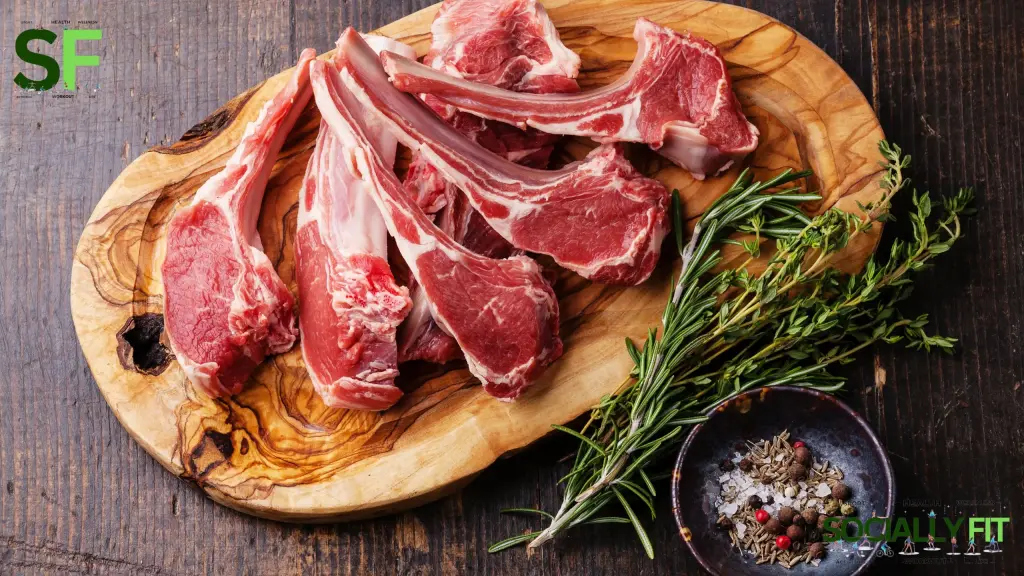
- High in Saturated Fat
Lamb can be high in saturated fat, which may raise LDL (bad) cholesterol levels and increase the risk of heart disease if consumed in large amounts. - Cholesterol Content
Lamb contains cholesterol, which can contribute to higher blood cholesterol levels. Individuals with high cholesterol should monitor their intake. - Caloric Density
Lamb is relatively calorie-dense, so eating it in large portions can contribute to weight gain if not balanced with other foods. - Potential for Overconsumption
Due to its rich flavor, it can be easy to overeat lamb, which can lead to excessive intake of fats and calories. - Environmental Impact
The production of lamb meat has a significant environmental footprint, including greenhouse gas emissions and high water usage. - Ethical Concerns
Concerns about animal welfare in large-scale lamb farming can be a drawback for those prioritizing ethical consumption. - Processing and Additives
Processed lamb products, such as sausages and deli meats, may contain additives and preservatives that could have adverse health effects. - Possible Allergies
Although rare, some individuals may have allergies or sensitivities to lamb, which can cause digestive issues or other allergic reactions. - Risk of Contaminants
Improper handling and cooking of lamb can lead to contamination with bacteria such as Salmonella or E. coli, posing food safety risks. - High Cost
Lamb is often more expensive than other meats, which can be a concern for those on a budget, potentially leading to less frequent consumption.
Is Lamb Meat Healthy
How to Incorporate Lamb Meat into a Healthy Diet

Portion Control and Balance
To enjoy lamb without overindulging in saturated fats, it’s essential to practice portion control. A serving size of 3-4 ounces is typically sufficient to reap the nutritional benefits without consuming too many calories or fats.
Healthy Cooking Methods
Opt for cooking methods that don’t require adding excessive fat, such as grilling, baking, or roasting. Avoid frying or using heavy sauces, which can increase the calorie and fat content of the dish.
Pairing Lamb with Vegetables
Lamb pairs wonderfully with a variety of vegetables, which can help balance the meal and add essential fiber. Consider serving lamb with roasted vegetables, a fresh salad, or a side of steamed greens to create a well-rounded and nutritious meal.
Is Lamb Meat Healthy
Comparing Lamb Meat to Other Meats
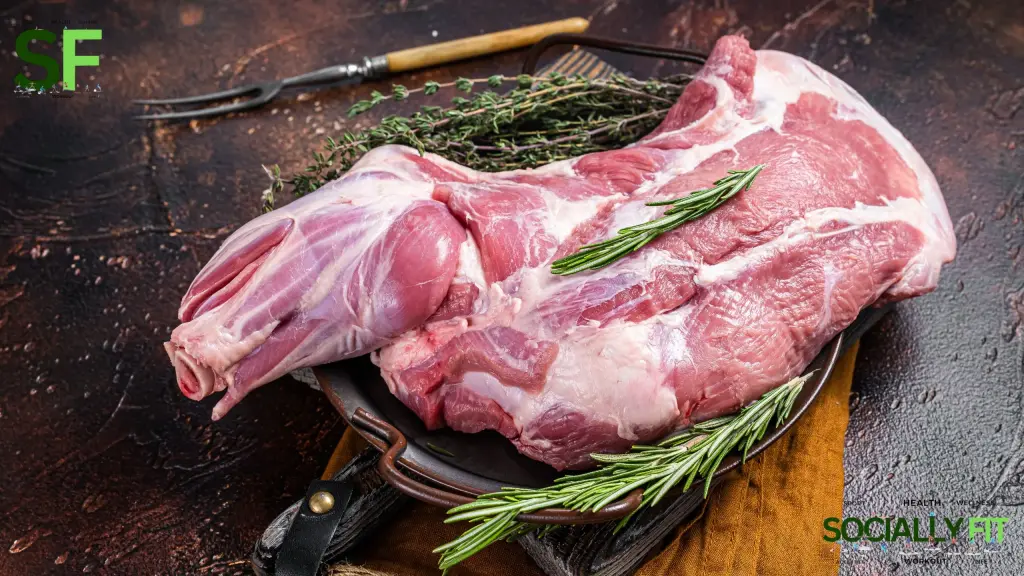
Lamb vs. Beef
When comparing lamb to beef, lamb typically has a higher fat content, especially in terms of saturated fats. However, lamb also contains more omega-3 fatty acids, particularly if it is grass-fed.
Lamb vs. Chicken
Chicken is often considered a leaner option compared to lamb, especially when skinless. However, lamb offers more iron and zinc per serving, making it a better choice for individuals needing these nutrients.
Lamb vs. Pork
Pork and lamb are similar in their fat content, but lamb tends to have a higher concentration of beneficial CLA. Pork is also lower in omega-3 fatty acids compared to lamb.
Is Lamb Meat Healthy
Who Should Avoid Lamb Meat?

Individuals with Heart Disease
Given its saturated fat content, individuals with heart disease should be cautious when consuming lamb. It’s recommended to limit portions and choose the leanest cuts available.
Those with High Cholesterol
Similarly, those with high cholesterol levels should monitor their lamb intake. Opting for grass-fed lamb, which is lower in fat and higher in omega-3s, may be a better choice for managing cholesterol levels.
Is Lamb Meat Healthy
How does the nutritional value of lamb meat compare to beef?
| Nutrient | Lamb Meat (100g) | Beef Meat (100g) | Description |
|---|---|---|---|
| Protein | 25.6 g | 26.1 g | Both lamb and beef provide high-quality protein, though beef has a slightly higher content. |
| Total Fat | 17.1 g | 15.4 g | Lamb has a slightly higher total fat content compared to beef, which may affect calorie intake. |
| Saturated Fat | 7.7 g | 6.0 g | Lamb contains more saturated fat than beef, which can impact cholesterol levels and heart health. |
| Omega-3 Fatty Acids | 0.2 g | 0.1 g | Lamb, particularly grass-fed, has slightly more omega-3s than beef, contributing to heart health. |
| Vitamin B12 | 2.3 µg | 2.0 µg | Lamb provides a bit more vitamin B12 than beef, essential for red blood cell formation. |
Sourcing and Selecting Quality Lamb Meat
Grass-Fed vs. Grain-Fed Lamb
Grass-fed lamb is generally considered healthier than grain-fed lamb due to its higher omega-3 content and lower overall fat levels. Additionally, grass-fed lamb is often raised in more humane conditions.
Organic and Free-Range Options
Organic lamb is raised without the use of synthetic pesticides, antibiotics, or growth hormones, making it a more natural choice. Free-range lamb is also typically raised in more humane and sustainable conditions.
Recognizing Fresh Lamb Meat
When selecting lamb, look for cuts with a fresh, pinkish-red color and minimal marbling. Avoid lamb with a strong odor or grayish color, as this may indicate it is past its prime.
Is Lamb Meat Healthy
Is lamb meat healthier than chicken in terms of fat and calorie content?
| Nutrient | Lamb Meat (100g) | Chicken Meat (100g) | Description |
|---|---|---|---|
| Calories | 258 kcal | 165 kcal | Lamb is more calorie-dense than chicken, which may impact weight management if consumed in excess. |
| Total Fat | 17.1 g | 3.6 g | Lamb contains significantly more total fat compared to chicken, affecting overall fat intake. |
| Saturated Fat | 7.7 g | 1.0 g | Lamb has a higher saturated fat content than chicken, which can influence cholesterol levels. |
| Monounsaturated Fat | 8.0 g | 1.2 g | Lamb is richer in monounsaturated fats compared to chicken, which can have varying health impacts. |
| Cholesterol | 90 mg | 85 mg | Both lamb and chicken are similar in cholesterol content, but lamb’s higher fat content can have additional effects on cholesterol levels. |
Sustainable and Ethical Lamb Consumption
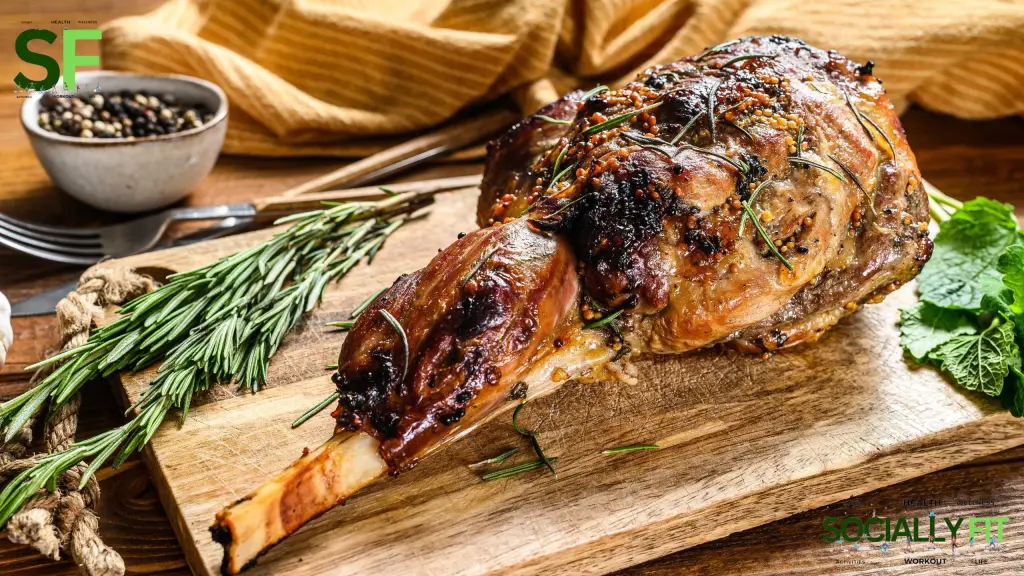
Supporting Local Farmers
Buying lamb from local farmers not only supports the local economy but also reduces the carbon footprint associated with transporting meat over long distances. Local farms often follow more sustainable and ethical farming practices.
Reducing Environmental Impact
To minimize the environmental impact of lamb consumption, consider reducing portion sizes or incorporating more plant-based meals into your diet. This approach allows you to enjoy lamb in moderation while still being mindful of the environment.
Is Lamb Meat Healthy
Conclusion: Is Lamb Meat Healthy?

Lamb meat can be a nutritious and delicious part of a balanced diet when consumed in moderation. Rich in protein, essential vitamins, and healthy fats, lamb offers several health benefits, including supporting muscle growth, boosting the immune system, and contributing to heart health. However, it’s important to be aware of the potential health risks associated with its saturated fat and cholesterol content. By choosing lean cuts, practicing portion control, and opting for grass-fed or organic options, you can enjoy lamb meat while maintaining a healthy lifestyle.
FAQ: Is Lamb Meat Healthy?
Is lamb meat better than beef?
Lamb meat is higher in omega-3 fatty acids but also has more saturated fat compared to beef. The choice between lamb and beef depends on individual dietary needs and preferences.
How often can I eat lamb meat?
Moderate consumption of lamb, such as once or twice a week, is generally considered safe for most people, especially when paired with a balanced diet.
Is lamb meat good for weight loss?
Lamb can be part of a weight loss diet if consumed in controlled portions and prepared using healthy cooking methods. Its high protein content can aid in satiety and muscle preservation.
Can I eat lamb if I have high cholesterol?
If you have high cholesterol, it’s advisable to limit lamb intake or choose leaner cuts and grass-fed options, which are lower in saturated fat.
What are the best ways to cook lamb meat?
Grilling, roasting, and baking are some of the healthiest ways to prepare lamb, as these methods reduce the need for added fats and maintain the meat’s nutritional integrity.
Is Lamb Meat Healthy
Click here to know more about weight loss. Subscribe to Workout with Hunar for weight loss and workout videos.








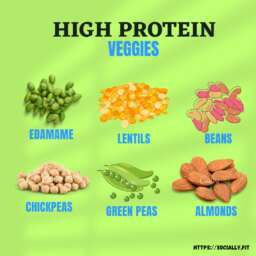
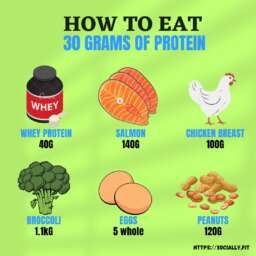

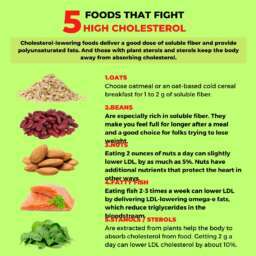
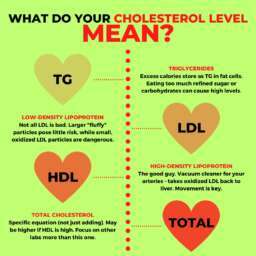


One thought on “Is Lamb Meat Healthy?”